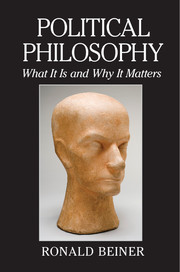Book contents
- Frontmatter
- Dedication
- Contents
- First Prologue: Horizons of Political Reflection
- Second Prologue: Freud, Weber, and Political Philosophy
- 1 Hannah Arendt: The Performativity of Politics
- 2 Michael Oakeshott: Life’s Adventure
- 3 Leo Strauss: The Politics of Philosophy
- 4 Karl Löwith: In Awe of the Cosmos
- 5 Excursus on Nature and History in the Strauss-Löwith Correspondence
- 6 Eric Voegelin: Modernity’s Vortex
- 7 Simone Weil: The Politics of the Soul
- 8 Hans-Georg Gadamer: Philosophy without Hubris
- 9 Jürgen Habermas: Politics as Rational Discourse
- 10 Michel Foucault’s Carceral Society
- 11 Alasdair MacIntyre: Fragmentation and Wholeness
- 12 Short Excursus on the Rise and Decline of Communitarianism as a Political Philosophy
- 13 John Rawls and the Death of Political Philosophy
- 14 Richard Rorty: Knocking Philosophy off Its Pedestal, or the Death of Political Philosophy Postmodernized
- Epilogue: On Not Throwing in the Towel
- Index
- References
Epilogue: On Not Throwing in the Towel
Published online by Cambridge University Press: 05 August 2014
- Frontmatter
- Dedication
- Contents
- First Prologue: Horizons of Political Reflection
- Second Prologue: Freud, Weber, and Political Philosophy
- 1 Hannah Arendt: The Performativity of Politics
- 2 Michael Oakeshott: Life’s Adventure
- 3 Leo Strauss: The Politics of Philosophy
- 4 Karl Löwith: In Awe of the Cosmos
- 5 Excursus on Nature and History in the Strauss-Löwith Correspondence
- 6 Eric Voegelin: Modernity’s Vortex
- 7 Simone Weil: The Politics of the Soul
- 8 Hans-Georg Gadamer: Philosophy without Hubris
- 9 Jürgen Habermas: Politics as Rational Discourse
- 10 Michel Foucault’s Carceral Society
- 11 Alasdair MacIntyre: Fragmentation and Wholeness
- 12 Short Excursus on the Rise and Decline of Communitarianism as a Political Philosophy
- 13 John Rawls and the Death of Political Philosophy
- 14 Richard Rorty: Knocking Philosophy off Its Pedestal, or the Death of Political Philosophy Postmodernized
- Epilogue: On Not Throwing in the Towel
- Index
- References
Summary
gadamer: I am very skeptical of every kind of pessimism. I find in all pessimism a certain lack of sincerity.
carsten dutt: Why?
gadamer: Because no one can live without hope.
Our topic in this book has been twentieth-century political philosophy. Twenty-first-century political philosophy doesn’t yet exist. It is impossible to imagine that the twenty-first century won’t generate political philosophy, but it has not yet taken shape, and therefore it is anyone’s guess what it will be. In my early career as a theorist, my thinking moved within a zone of theorizing largely delimited by about half a dozen important thinkers: Arendt, Habermas, Gadamer, Strauss, MacIntyre, and Charles Taylor. My life as a theorist has been in large part a continuing dialogue with these thinkers, and an effort to put them in a dialogue with each other. As I hope this book evidences, this dialogue, or set of dialogues, is still in progress. Naturally, the longer one reflects on these thinkers, the more attentive one becomes to the philosophical weaknesses in each of them. I am certainly no longer the Arendtian or Habermasian or Gadamerian or Straussian or communitarian that I may have been at earlier stages of my intellectual journey. But in good Hegelian fashion, these earlier stages of theorizing do not get simply discarded or jettisoned as one obtains better insight into the limits of these philosophical sources (again, they all have their limitations and weak spots). Restating some of the things I learned from these thinkers cannot help but be an exercise in criticism (and self-criticism), but focusing just on the criticism does not do justice to the philosophical education supplied by such a dialogue. If we have succeeded in our task in this book, we have shown that it is possible to show respect for these thinkers as interlocutors in a critical dialogue without bowing down to them as gurus. That is, we have sought to treat them as deserving of gratitude for serving as exemplars of the practice of political philosophy in its most ambitious versions without absolving them of tough intellectual challenges.
- Type
- Chapter
- Information
- Political PhilosophyWhat It Is and Why It Matters, pp. 229 - 236Publisher: Cambridge University PressPrint publication year: 2014



